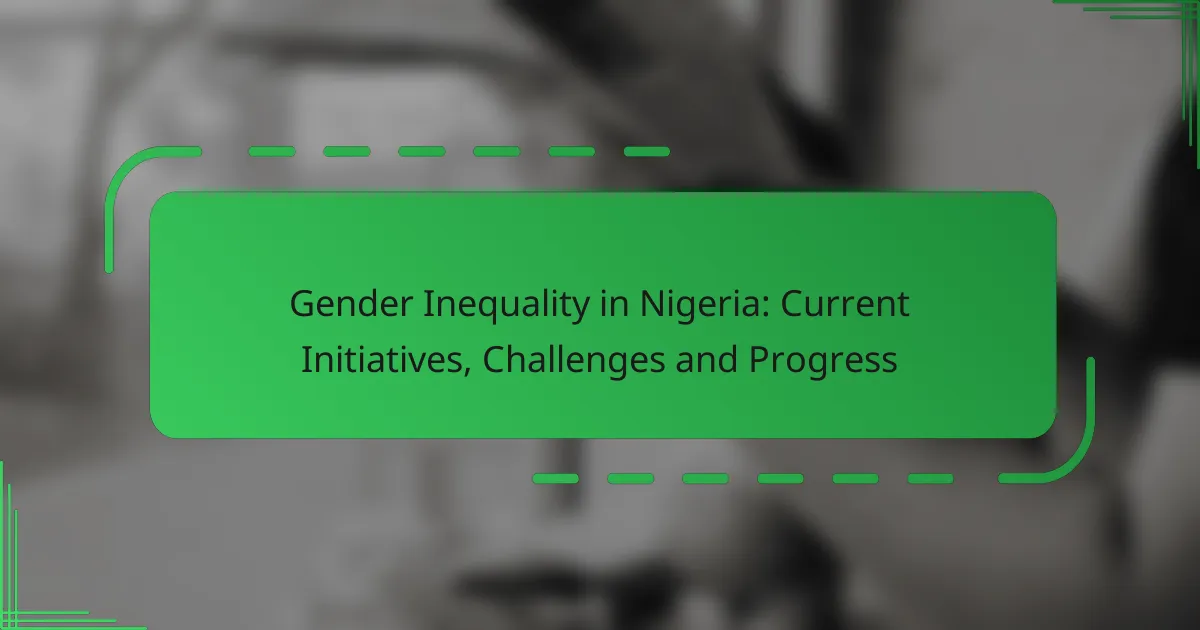Youth unemployment in Nigeria poses a critical challenge, driven by factors such as inadequate education, economic instability, and a lack of job opportunities. This issue not only hampers individual potential but also threatens the nation’s economic growth and social stability. Addressing it requires comprehensive strategies, including government initiatives and skills training, to empower young people and enhance their employability.

What are the solutions to youth unemployment in Nigeria?
Addressing youth unemployment in Nigeria requires a multifaceted approach that includes government initiatives, skills training, and support for entrepreneurship. Effective solutions can empower young people, enhance their employability, and stimulate economic growth.
Government job creation programs
Government job creation programs are essential for reducing youth unemployment in Nigeria. These initiatives often focus on sectors like agriculture, construction, and technology, aiming to generate thousands of jobs annually.
Programs such as the National Social Investment Program (NSIP) provide direct employment opportunities through public works and community service projects. These initiatives not only create jobs but also contribute to local development.
Skills training initiatives
Skills training initiatives equip young Nigerians with the necessary competencies to meet market demands. These programs often focus on vocational skills, digital literacy, and entrepreneurship training.
Organizations like the Industrial Training Fund (ITF) and various NGOs offer training sessions that can last from a few weeks to several months, helping participants gain practical skills that enhance their employability.
Entrepreneurship support schemes
Entrepreneurship support schemes encourage young people to start their own businesses, which can be a significant source of employment. These schemes often provide training, mentorship, and financial assistance.
For instance, the Youth Enterprise with Innovation in Nigeria (YEAIN) program offers grants and loans to young entrepreneurs, helping them launch and sustain their businesses in various sectors.
Public-private partnerships
Public-private partnerships (PPPs) can play a crucial role in tackling youth unemployment by leveraging resources and expertise from both sectors. These collaborations can lead to the development of job creation projects that are more efficient and sustainable.
Examples include joint ventures between government agencies and private companies to create training centers or incubators that focus on skill development and job placement for young people.
Access to microfinance
Access to microfinance is vital for young entrepreneurs who may lack traditional collateral. Microfinance institutions provide small loans that enable young people to start or expand their businesses.
In Nigeria, organizations like the Bank of Industry (BoI) and various microfinance banks offer tailored financial products designed for youth, helping them overcome financial barriers and contribute to job creation in their communities.

What are the main causes of youth unemployment in Nigeria?
The main causes of youth unemployment in Nigeria include a lack of job opportunities, inadequate education and skills mismatch, economic instability, and corruption. Each of these factors contributes significantly to the challenges faced by young job seekers in the country.
Lack of job opportunities
The scarcity of job opportunities is a critical factor driving youth unemployment in Nigeria. With a rapidly growing population, the job market cannot keep pace with the increasing number of graduates entering the workforce each year.
Many sectors, such as agriculture and manufacturing, have not expanded sufficiently to absorb the influx of young workers. This gap leads to high competition for the few available positions, leaving many young people without employment.
Inadequate education and skills mismatch
Inadequate education and a mismatch between the skills taught in schools and those required by employers contribute to youth unemployment. Many educational institutions in Nigeria do not align their curricula with the needs of the job market, resulting in graduates who lack relevant skills.
This disconnect means that even when job opportunities exist, many young applicants are not qualified, which further exacerbates unemployment rates. Vocational training and skill development programs are essential to bridge this gap.
Economic instability
Nigeria’s economic instability significantly impacts youth unemployment. Fluctuations in oil prices, which are crucial to the economy, can lead to job losses and reduced hiring in various sectors.
Additionally, inflation and currency devaluation can diminish purchasing power, making it challenging for businesses to operate and expand. This instability discourages investment and job creation, leaving many young people without viable employment options.
Corruption and mismanagement
Corruption and mismanagement within both public and private sectors hinder job creation and economic growth in Nigeria. Resources that could be used for job creation are often misallocated or siphoned off, leading to inefficiencies.
This environment discourages foreign and local investment, which is vital for generating new jobs. Addressing corruption and improving governance could lead to more opportunities for youth in the labor market.

What are the impacts of youth unemployment in Nigeria?
Youth unemployment in Nigeria has significant negative effects on society, economy, and the overall stability of the nation. High rates of joblessness among young people lead to various social issues, including increased crime, social unrest, economic stagnation, and brain drain.
Increased crime rates
High youth unemployment often correlates with rising crime rates. Young individuals without jobs may turn to illegal activities as a means of survival, leading to a surge in theft, robbery, and other criminal behaviors. This not only affects the safety of communities but also strains law enforcement resources.
In Nigeria, areas with high unemployment rates frequently report higher incidences of violent crime, which can create a cycle of fear and instability. Addressing youth unemployment is crucial for reducing crime and enhancing public safety.
Social unrest and instability
Youth unemployment can lead to social unrest and political instability. Disillusioned young people may engage in protests or riots, driven by frustration over their lack of opportunities. Such unrest can disrupt daily life and hinder economic growth.
In Nigeria, instances of protests against government policies often stem from high unemployment rates among the youth. These movements can escalate quickly, leading to clashes with law enforcement and further destabilizing the region.
Economic stagnation
The high levels of youth unemployment contribute to economic stagnation in Nigeria. When a significant portion of the population is unable to find work, consumer spending decreases, which in turn affects businesses and overall economic growth. This creates a vicious cycle that is hard to break.
Moreover, the lack of skilled workers in the job market can deter foreign investment, further exacerbating economic challenges. Encouraging entrepreneurship and vocational training can help mitigate these effects and stimulate economic activity.
Brain drain
Brain drain occurs when educated and skilled young individuals leave Nigeria in search of better job opportunities abroad. This phenomenon is often fueled by high unemployment rates, as many young people feel their skills are underutilized in their home country.
The loss of talent not only impacts the economy but also hinders innovation and development. To combat brain drain, Nigeria needs to create more job opportunities and improve working conditions to retain its skilled workforce.

How does education influence youth unemployment in Nigeria?
Education significantly impacts youth unemployment in Nigeria by shaping the skills and competencies of young individuals. A mismatch between educational outcomes and labor market needs often leads to high unemployment rates among educated youth.
Quality of education
The quality of education in Nigeria varies widely, affecting the employability of graduates. Many institutions struggle with inadequate facilities, poorly trained teachers, and outdated teaching methods, which limit students’ practical skills.
Improving educational quality involves investing in teacher training, updating curricula, and ensuring access to modern learning resources. Schools that prioritize hands-on experience and critical thinking tend to produce more employable graduates.
Relevance of curriculum
The relevance of the curriculum to the job market is crucial for reducing youth unemployment. Many educational programs do not align with the skills demanded by employers, leading to a surplus of graduates in fields with limited job opportunities.
To address this issue, educational institutions should collaborate with industries to develop curricula that reflect current market needs. Incorporating technology and soft skills into programs can enhance graduates’ employability.
Access to vocational training
Access to vocational training plays a vital role in equipping youth with practical skills that are in demand. However, many young people in Nigeria lack access to quality vocational programs, which limits their job prospects.
Expanding vocational training opportunities can help bridge the skills gap. Government initiatives and partnerships with private sectors can facilitate the establishment of training centers that focus on high-demand trades and skills.

What role do government policies play in addressing youth unemployment?
Government policies are crucial in tackling youth unemployment by creating an environment conducive to job creation and economic growth. Effective policies can stimulate employment opportunities, enhance skills development, and support entrepreneurship among young people.
Employment generation policies
Employment generation policies focus on creating jobs directly through public sector initiatives and indirectly by incentivizing private sector growth. These policies may include tax breaks for companies that hire young workers or funding for vocational training programs aimed at equipping youth with relevant skills.
For instance, the Nigerian government has implemented various schemes, such as the National Social Investment Program, which aims to provide job opportunities for young people through community service and entrepreneurship support. Such initiatives can significantly reduce youth unemployment rates when effectively executed.
Investment in infrastructure
Investment in infrastructure is essential for fostering economic activities that lead to job creation. Improved infrastructure, such as roads, electricity, and internet access, can enhance business operations and attract foreign investment, which in turn creates more employment opportunities for youth.
In Nigeria, ongoing projects like the development of transportation networks and power supply improvements are vital. These investments not only create construction jobs but also enable businesses to thrive, ultimately leading to sustainable job creation for young people.
Regulatory frameworks for businesses
Regulatory frameworks play a significant role in shaping the business environment, influencing how easily companies can operate and hire workers. Streamlined regulations can reduce barriers to entry for new businesses, encouraging entrepreneurship among youth.
In Nigeria, simplifying business registration processes and reducing bureaucratic hurdles can empower young entrepreneurs to start their ventures. Policies that support small and medium-sized enterprises (SMEs) through access to funding and mentorship can further enhance job creation in the youth demographic.



